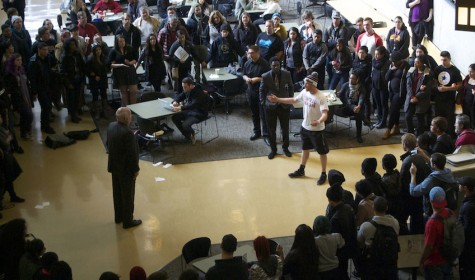Protests at Mizzou spark responses nationwide
November 21, 2015

The demonstration at Central last Thursday was meant to show solidarity with protestors at the University of Missouri
On Monday, Nov. 9, University of Missouri President Tim Wolfe announced his resignation in response to growing pressure from students following multiple cases of documented racism on the Mizzou campus.
According to CNN, documented accounts of racism at Missouri span as far back as 2010, when two white students scattered cotton balls outside the Black Culture Center–a well-known center on campus, but especially recognized as a safe space for black students.
Recent events, however, reached a boiling point on campus when three separate accounts of racist acts pushed students to challenge their president who, in their opinion, had done little to create a safe campus, The New York Times reported.
On Sept. 12, student government President Payton Head, who is black and gay, was the recipient of racial slurs and homophobia in an incident off-campus. He shared his frustrations on social media, which quickly spread and reached thousands of recipients.
In a Facebook post that has since been removed, Head said, “For those of you who wonder why I’m always talking about the importance of inclusion and respect, it’s because I’ve experienced moments like this multiple times at THIS university, making me not feel included here.”
Another incident happened on Oct. 4, when a drunk white student spouted racial slurs and disrupted the Legion of Black Collegians, a student group, as they prepared for homecoming activities.
According to The New York Times, Missouri Chancellor R. Bowen Loftin was also under pressure of losing his job when students and university leaders felt that the recently appointed chancellor had not shown enough action after a swastika made of feces was drawn on a dormitory wall.
The New York Times reported that deans of nine of Missouri’s schools called for Loftin’s removal. Following the protests, he has remained employed, but in a research role.
The feces swastika incident happened on Oct. 24, four days after Concerned Student 1950 was formed–a student group named for the year black students were first admitted to the university.
CNN reported that the group issued a list of demands: an apology from Wolfe, his removal from office and a more comprehensive diversity inclusion curriculum overseen by minority students and faculty.
It wasn’t until a hunger strike launched by Jonathan Butler, a graduate student upset at the university’s decision to stop paying for health insurance for graduate teaching and research assistants, that the movement really gained traction.
In a statement to CNN, Wolfe issued an apology to Concerned Student 1950.
“Racism does exist at our university, and it is unacceptable. It is a long-standing, systemic problem which daily affects our family of students, faculty and staff,” Wolfe said.
On Nov. 8, black football players announced they wouldn’t play or practice until Wolfe resigned. According to CNN, the Athletic Department and coach Gary Pinkel, in addition to white players, announced their support.
The next day, Wolfe resigned.
According to Gianni Glover, senior advertising executive for the Central Black Student Union, student activists sent out a call to action to groups across the nation asking for solidarity in protest.
It was through this call to action that students from several of Central’s diversity groups were able to organize a protest in the SURC Marketplace last Thursday.
